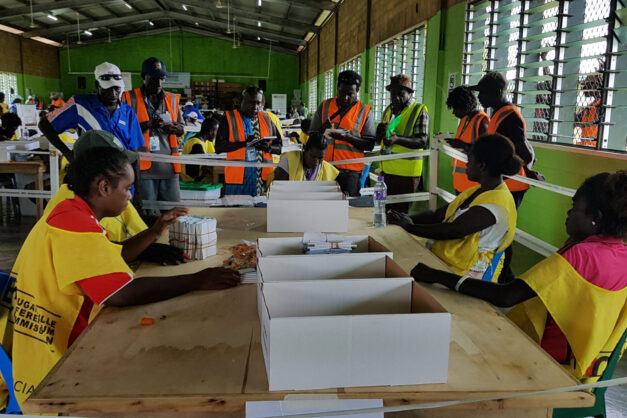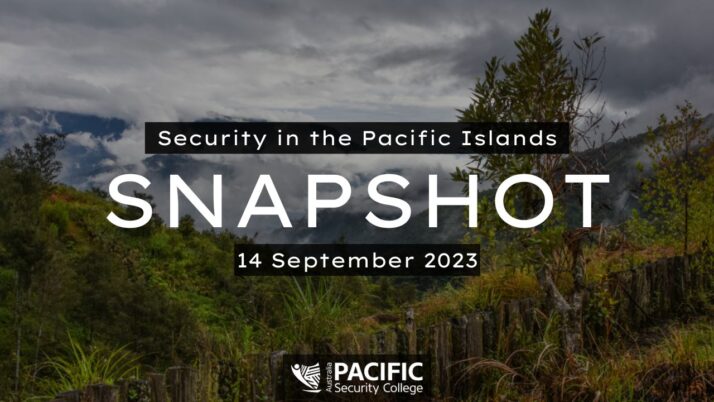This article is based upon a paper published by ANU Department of Pacific Affairs (DPA). The original paper can be found here.
Women’s inclusion in the Bougainville negotiations

Photo: Llane MUNAU / AFP
Women’s voices are needed in post-referendum Bougainville negotiations to ensure lasting peace, Michael Kabuni and Ancuţa Hansen write.
In a non-binding referendum in late 2019, 97.7 per cent of Bougainvilleans voted for independence from Papua New Guinea (PNG). Yet despite independence being an issue of concern for the whole community in both PNG and Bougainville, women have largely been left out of the formal negotiations.
There is widespread consensus that women should be equally represented in peace negotiations during conflicts and in subsequent peacebuilding efforts, but women tend to remain marginal in such processes.
In Bougainville, women played an integral role in the peace process at the grassroots level during the decade-long conflict. However, despite their significant contributions, women were largely excluded from the negotiations that preceded the 2001 Bougainville Peace Agreement.
Currently, the PNG Government and the Autonomous Bougainville Government (ABG), as well as a Joint Supervisory Body (JSB) – the agency that oversees the peace process – are conducting consultations on a political settlement for Bougainville, which is due no later than 2027. This consultation process is the last stage of the process mandated in the peace agreement.
The general principles of intergovernmental consultations between PNG and the ABG are enshrined in part XIV of the PNG constitution, the Bougainville constitution, and the peace agreement. However, these documents do not include specific provision for the inclusion of women and other groups in the JSB and on the agenda of the joint consultation process.
In order to understand how women in PNG and Bougainville viewed the consultations and peacebuilding, we conducted extensive interviews and focus groups with former and current members of parliament (MPs), members in the consultation teams and other officials, women civil society leaders, ex‑combatants, and academics. Two focus groups were conducted in Port Moresby, the PNG capital, and two in Buka, Bougainville.
This research showed that the delegations attending the intergovernmental and JSB talks — one representing the PNG government and the other representing the ABG — were all male. A number of officials from PNG and Bougainville, as well as foreign diplomats, attend the JSB meetings in an ‘observer’ role, but it is unclear whether there are any guidelines or criteria for attendance, and how many of them are women.
The four Bougainville women MPs participate as ‘observers’ at the JSB meetings. As the JSB is a political body, and PNG does not have women MPs, there are no women represented on the PNG side.
Significantly, there was a large knowledge gap between Bougainville and PNG participants about the consultation process, and in particular about the role of the various bodies and their operations. Participants in Bougainville professed familiarity with the consultation structures overall and saw the consultation process as a work in progress, whilst those in Port Moresby had very little awareness of the process.
This disparity may be because the Bougainville government has put more effort into ensuring that different members of society are be involved in the negation process. In 2019, the Bougainville government established the Bougainville Leader’s Consultation Forum, composed of all members of the Bougainville House of Representatives (BHOR) and members of civil society, women, youth, and other recognised leaders.
In November 2020, the BHOR adopted the Independence Ready Mission resolution, which included the establishment of committees, including women leaders, in all constituencies so that citizens could be involved in nation building. Those who do not directly participate in the PNG–Bougainville consultations use these forums to express their views.
Bougainvilleans were supportive overall of the ABG’s efforts to design an inclusive intra-regional process in its internal consultation structures. However, there were concerns that that the views raised at the various Bougainville forums are not always presented at the intergovernmental consultations.
In contrast, Port Moresby residents lamented that the national government has not created similar grassroots consultation tracks. As a result, many view the PNG position as representing predominantly the views of government officials and MPs.
Despite these differences, there was broad consensus between both groups about the value of having women at the negotiation table to ensure fair representation and better outcomes. Some women said they would also feel encouraged if a moderator and government officials explicitly acknowledged the importance of having women in the talks, which would bolster women’s confidence to speak up.
Including more women in the process is vital to ensure society-wide buy in to the negotiations and reduce the risk of renewed conflict. Throughout the research it was clear that there were wide concerns about a lack of opportunities for women to develop their civic participation skills and practice leadership.
Many talked about a need to strengthen information exchanges between women’s groups and official delegations to encourage the consultation parties to protect women’s rights. This would also have the effect of creating more avenues for advocacy outside the PNG parliament, which has no women members at the moment.
The international community remains an important pillar for the inclusion of women and marginalised groups in the post‑referendum consultation process. There is wide recognition of the need to build on inclusion successes in Bougainville by further supporting the elected members push to bring in more women MPs into the BHOR. However, at the same time, there is a need for respect of Melanesian culture, long‑term engagement, and strategic patience from development partners.
Ultimately, for the process to be successful and the outcomes sustainable, inclusion must be at the heart of the post-referendum consultations. As a woman leader in Bougainville stated:
“The best possible decision outcome must be one that is achieved because of inclusive decision-making. There must be inclusion, and the decisions must promote the wishes of the people.”
Michael Kabuni and Ancuţa Hansen
This piece was first published on Policy Forum.
More Stories
Security Snapshot - 28 Mar 2024
Pacific Security Snapshot | 28 March 2024
Summary ➣ Heavy rains, floods, landslides and earthquakes batter the region ➣ Pacific submissions to the International Court of Justice (ICJ) on climate change responsibility ➣ Elections across the Pacific prompting changes to diplomatic relations and security arrangements ➣ Challenges for women in politics Climate Security Lives have been lost in PNG after a series…

Security Snapshot - 15 Sep 2023
Pacific Security Snapshot | 15 September 2023
The security stories shaping the region ➣ Pacific Islands Forum Women Leaders Meeting ➣ Pacific High-Level Dialogue on Climate Change ➣ Fiji to sign Status of Forces Agreement with France ➣ Palau expands United States maritime law enforcement agreement ➣ Papua New Guinea special elite force to combat tribal violence ➣ Australia extends police presence…






